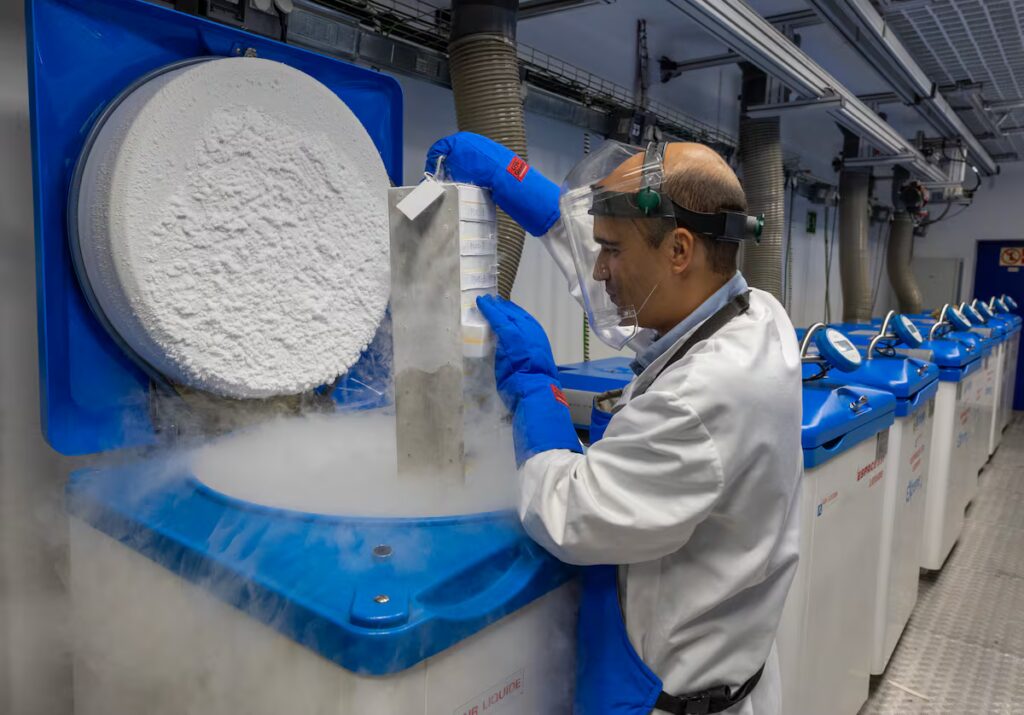
It’s the worst nightmare for a major research center dedicated to understanding and fighting one of the worst known evils. Is it possible that the National Center for Cancer Research (CNIO), one of the country’s scientific jewels, hosted a corrupt network that awarded contracts to friendly companies without following proper procedures? A former manager who worked at the center since 2005 is convinced of this. Over the last decade, around 20 million euros have been deducted from the budget of this public body, as claimed in a complaint presented to the Anti-Corruption Prosecutor’s Office and to which this newspaper had access.
“It’s a very uncomfortable situation,” acknowledges the manager, who until August was the operational director of the CNIO. He requests anonymity under the Whistleblower Protection Act, as he believes his obligation was to expose the reality he claims he began to encounter in late 2024, while auditing the organisation’s accounts. He says he felt “fear, disappointment, insecurity”; to the point of spending months collecting data on hard drives and using a computer disconnected from the Internet so that his former bosses couldn’t track him.
“I didn’t want sufficient proof, but absolute proof. It had to be a rigorous and extensive complaint. We worked for six months, night and day, with the help of several colleagues who are still in the center. I thought: either this is very good, or it will escape me again”, explains the former director. He is referring to Juan Arroyo, former director general of the CNIO and, according to him, the main person responsible for the network of irregular contracts. For the complainant, Arroyo was a close friend for more than 15 years, with whom he shared both work and birthday celebrations at his home. Since he discovered the alleged fraud they have no longer spoken to each other. “I realized that everything follows its own logic. He saw a way to take advantage of everything that happened to him,” he laments. The aforementioned denies all charges.
The complaint warns of “a series of patterns” in the hiring of services and staff at the CNIO. Since 2007, a group of “satellite companies” has emerged with the ostensible goal of “getting all the contracts” for outsourced activities. One example is Gedosol, founded by the former CNIO chief of staff, which took more than 15 million contracts, according to the complaint. Zeus SL, created by the centre’s former technical director, reportedly had a turnover of 5.4 million euros. Alaos ITL SL, linked to the organization’s former purchasing director, achieved a turnover of 11 million euros. And there is also Navestalia, which manages an industrial warehouse in San Agustín de Guadalix, near Madrid, presumably linked to the former CEO. The network companies had the CNIO as their only client and would have won practically all the tenders in which they participated, according to the text of the lawsuit.
The only one of these companies that responded to this newspaper’s questions is Alaos, which “categorically rejects any hypothesis of improper conduct”. “The company is examining in depth all the documentation relating to historical contracts with the CNIO in order to provide, if necessary, with maximum transparency, objective data on costs and benefits throughout the contractual relationship,” it adds in a statement.
According to the account provided to the Prosecutor’s Office, in some cases these companies were responsible for hiring personnel to provide services that the CNIO previously provided, such as the secretariat of research groups. This allowed him to continue hiring staff despite the restrictions the center suffered during the crisis years. On other occasions, companies have received tens of thousands of euros for work that was never carried out, again according to the complaint, which is 120 pages long and was presented by The world.
The complainant’s analysis points to alleged chained contracts for 49,900 euros or 14,900 euros, just below the limits that guarantee greater control, as required by the Science Act and the centre’s internal contractual guidance respectively. One of these contracts, close to 50,000 euros, concerned the supply of masks. When they arrived, they had to be discarded because they were virtually impossible to wear due to the length of the elastics, the complainant claims. According to their analysis, there are indications of a split of over one million euros between 2018 and 2024.
“It’s a mafia, a mafia organisation”, summarizes the complainant, who presented the document on Anti-Corruption at the end of June. The complaint was accepted, but the Prosecutor’s Office has not yet made any move. None of the parties involved have yet received any request or communication.
The complainant and another former colleague who had helped him analyze the accounts were fired in August with a disciplinary file for allegedly obstructing essential contracts at the CNIO that endangered the organisation’s integrity, according to sources close to the process. Both have reported the center for alleged unfair dismissal and are awaiting the trial which will be held in 2026. It still remains an enigma whether the Prosecutor’s Office will give credibility to what has been reported and open proceedings or close the case. A key point is to clarify the existence of the bites, which the current complaint does not do.
This crisis overshadows the new stage expected for the CNIO, the flagship of cancer research. In January, the organization’s board of directors fired the general director, Juan Arroyo, and the scientific director, María Blasco, against whom there were accusations of harassment in the workplace and negligence in duties, as reported by EL PAÍS. Both had held their positions for more than a decade. The confrontation between the two has segregated the center into two sometimes irreconcilable parts. In recent years the CNIO has survived with obsolete or damaged structures, while the scientific leaders denounced the management’s contempt. What was supposed to be the best oncology research center lived in “a climate incompatible with excellence”, as the Minister of Science, Diana Morant, recognized after dismissing Blasco and Arroyo, who returned to their previous roles as group leader and deputy economic director respectively.
Although in the previous crisis the focus was on Blasco, now the focus is on Arroyo. “I didn’t do anything outside the law,” the 70-year-old economist and financial inspector says by phone. “All actions were endorsed by the IGAE (state intervention) and the Court of Auditors. These same complaints were already the subject of a complaint (submitted by Vox), which was rejected. And I can’t say more until I receive the new complaint,” adds Arroyo.
The government does not want to wait for this to happen. He has called for an emergency meeting of the board of directors for Tuesday – the highest governing body of the CNIO – whose honorary president is Morant, and in which four autonomous communities that alternate every two years are also represented – currently the Balearic Islands, Castile and León, Extremadura and Murcia, governed by the PP – and three private administrators. The legal representative of the center in that meeting, and possibly its protagonist, will be José Manuel Bernabé Sánchez, new director general from September. Bernabé arrived with two clear objectives: to relaunch the institution and to analyze past accounts in detail to clarify responsibilities.
It is likely that decisions will be made at this meeting to “clean up” the organization, according to sources in the Ministry of Science. Senior officials in this department were alerted in March and August to the irregularities and the alleged deduction of millions of dollars by the complainant. The two fired managers even asked for “protection” for “retaliation”.
The Ministry of Science claims to have informed the board of directors of this complaint, which some employers deny. From Morant’s apartment the complainant is viewed with suspicion. They believe he is angry because he was not chosen as the new coach. They also underline that the two dismissed held positions of responsibility in the years in which the alleged irregularities were committed.
In turn, the complainant feels discriminated against and ignored by the Ministry for having worked as an advisor to Minister Luis de Guindos during the government of Mariano Rajoy (PP) between 2012 and 2018. “At least 33% of our population places their hopes in the CNIO, who will suffer from cancer all his life; and we will take it upon ourselves due to an internal battle. We have to solve it from the outside”, they explain from the Ministry.





